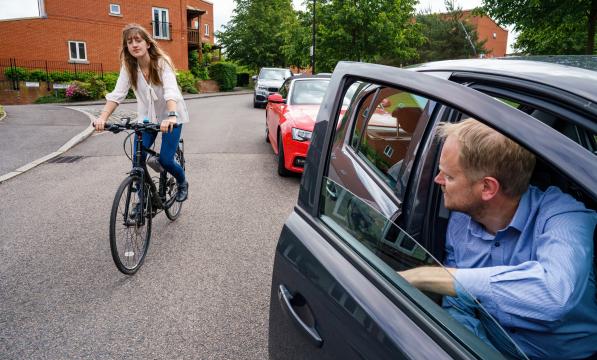Encouraging car dooring is fine - it's just "heavy irony" says Sunday Times

Heavy irony and human foibles
It's all about "heavy irony", according to the Executive Editor of The Sunday Times, Bob Tyrer. Besides, he says, the paper's columnist Rod Liddle is merely "a commentator on human foibles, not a diplomat".
Mr Tyrer was writing in response last night to letters of complaint sent by Cycling UK's CEO Paul Touhy, and May Hamilton, the widow of Robert Hamilton (letters below). Those complaints concerned comments by Mr Liddle in his Sunday Times column of 18 December, referring to cyclists, and boasting that "when in London I repeatedly open and close my taxi door to try and catch one of them at it and send him flying."
The victims Liddle thinks weren't normal humans
Given that May's husband died after a driver opened her car door in front of him as he cycled along Linaker Street in Southport, she agreed with Cycling UK that it was irresponsible and dangerous for a national newspaper to publish an article in which Liddle appeared to glorify "car- dooring" cyclists, and described his own alleged attempts to do so as his "bit to make London a safer place for normal humans."
Cycling UK were concerned that Liddle considered Robert, Sam Boulton, and Sam Harding, all to be people outside of his "normal human" category. People therefore deserving to be the target of his London taxi door tactic; except it's too late, as all three have died whilst cycling in recent years, in car dooring incidents.
Opening a car door on a cyclist is something Liddle described as a "beautifully timed manoeuvre", when applauding the actions of the Transport Secretary Christopher Grayling, who was recently captured on camera opening the passenger door of his ministerial car into the path of cyclist Jaiqi Liu.
We're just not clever enough to get Liddle's humour
It seems however, that we at Cycling UK, and May Hamilton, must have a sense of humour bypass. We aren't sophisticated enough to appreciate Liddle's cunning intellectual wit. You see, as Mr Tyrer has now explained, Liddle's purpose "was not to condone such tragedies but to ridicule Mr Grayling by heavy irony."
So, when May exchanged e-mails with me last night after receiving Mr Tyrer's email, expressing the view that she thought she deserved better from The Sunday Times, she was obviously, like me, just missing the heavy irony thing. We thought that irony was a poor excuse for inciting violence, but we obviously didn't get the clever journalist bit, where you say something outrageous but mean something else.
Abuse by excuse
Obviously Mr Tyrer and the Sunday Times will be perfectly content that there is no danger that heavy irony might just be abuse by excuse, and that Liddle's previous comments that too few cyclists are being killed on our roads, in no way reflect his real views, but rather display the literary wizardry of heavy irony. Mr Tyrer does concede that Liddle's humour might not be to everyone's taste, which might explain the Independent Press Standards Organisation (IPSO) ruling back in 2015 regarding Liddle's article in the Sun, where he, presumably with heavy sarcasm, mocked Emily Brothers' gender identity and disability. Disappointingly, neither she nor IPSO understood Liddle's sophisticated literary technique.
For her part, May remains unconvinced that when Liddle wrote about his respect for Mr Grayling, in taking the "menace of cyclists seriously", and being prepared to "knock one off his bike", leaving him "whimpering", that Liddle was really seeking to ridicule the Transport Secretary. In the absence of any apology or retraction from the Sunday Times, she plans to make a further complaint to IPSO. However it seems that encouraging criminal activity, boasting about trying to assault cyclists, and distressing the families of victims who have died, does not fall neatly within the existing IPSO editors code!
A complete justification of Liddle's article
Cycling UK had hoped that the editor of the Sunday Times might look beyond the strict rules of the code, and ask whether Liddle's article was reckless from a road safety standpoint, insensitive to victims, and generally in appalling taste. But that was all before Mr Tyrer explained heavy irony to us.
And without any heavy sarcasm, how this totally justifies everything Liddle wrote, and The Sunday Times' decision both to publish and to stand by the offending article.
Accordingly, the editor of The Sunday Times is not behaving in any way contrary to the spirit of its sister paper, The Times, and their excellent "Cities fit for cycling campaign" following the serious injury to their news reporter Mary Bowers in November 2011. This is where the irony and sarcasm thing becomes tricky, because I do actually mean what I've just said about The Times' campaign.
Just a final thought as I try and grasp how to apply the "heavy irony" ruse: does this mean that if I write an article outlining how people should respond to Mr Liddle if they meet him in the street, that I can claim "heavy irony" as a defence if somebody does what I suggest?
T'was not my fault M'Lud. T'was those unsophisticated people who didn't understand my sense of humour - I was being heavily ironic!
No doubt the editors at The Sunday Times have an explanation as to why the rules would be different for me, given that I am, unlike Liddle, not a respected commentator on people's foibles.




